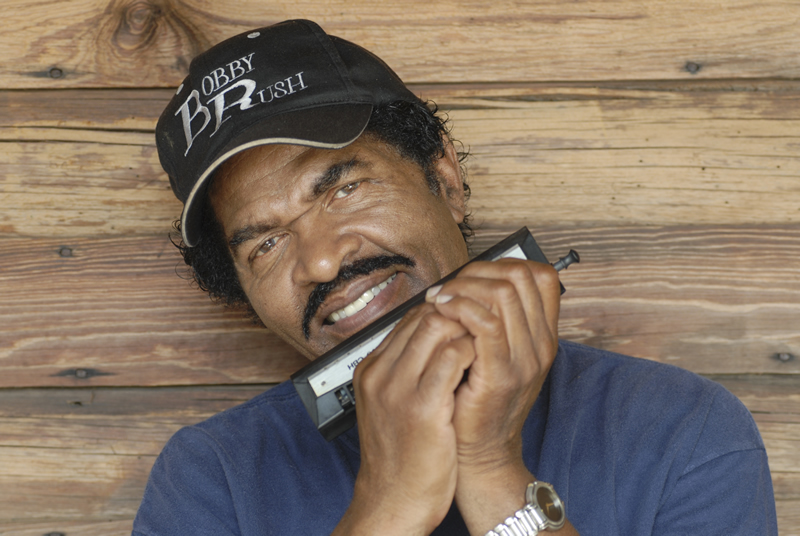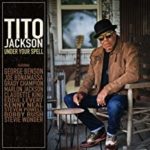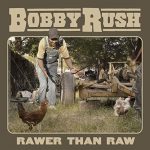By Jim Hynes
“Man, I never thought I’d see a box set covering 50 years, and that’s not all of it. I never thought I’d live long enough to see it.” At 82, Bobby Rush is the elder statesman of the blues, and he knows it.
“You know, B.B. King asked me to work his last show in Mississippi, and while I was honored, I told him I had a gig in Memphis,” Rush recalled, when I had the chance to speak with him about his illustrious career. “I called the promoter [of the Memphis gig], and he said, “If you’re going to do it for B.B., go ahead.” B.B. had me on stage with him for an hour and a half, and the promoter paid me for my Memphis gig even though I wasn’t there. Two weeks before B.B. passed, I won the B.B. King Entertainer of the Year Award. Wow! The torch was really passed, wasn’t it?”
It’s not that Rush is conceited, he simply knows his worth. “If you’re going to have a blues festival, you’re calling either Buddy Guy or me, right?” Right. After all, Rush not only won the aforementioned B.B. King Entertainer of the Year Award at the 2015 Blues Music Awards, he also won the award for Best Soul Blues Male Artist. A month after that, he was inducted in the Rhythm & Blues Music Hall of Fame in Clarksdale, MS. Sufficed to say, it’s been a good year for Bobby Rush.
But like Buddy Guy, Rush shows no signs of slowing down, and even alluded to a major project in the wings next year that he’s taking to a label bigger than his own, Deep Rush. In the meantime, fans can savor the recently released Chicken Heads: A Fifty Year History Of Bobby Rush, a nearly 100 selection box set across four discs. Listening to this collection is like sampling every important era of black music from the 1950s right up until today. If Bobby Rush didn’t set the trends, he was right on top of them, with Chicago blues in the 1950s to soul and funk in the 1970s and 1980s, to all genres, including Americana, in the past decade. To Rush, the genre hopping is no big deal. “My publicist and one the producers on this project, Cary Baker, along with Paul Brown, one of my production people, helped me cross over to the Americana audience with the rawness of Down In Louisiana,” Rush told me. “Cary knew where I was going, and took it to another level. Americana and blues aren’t so different. We’re all singing about the same things. It’s just how you treat the music.” Across the set, the music is culled from 20 different labels, with representation from Chess, Ichiban, Philadelphia International, Malaco/Waldoxy and his own Deep Rush. The 32 page, full-color booklet has testimonials from Mavis Staples, Leon Huff and Denise LaSalle to name just a few. In addition to Rush’s ability to assimilate blues, funk and soul into his singular style, his wordplay is often unpredictably creative, as is his harmonica playing.
Rush reflects back on over fifty years of making music, and how his fan base has changed— and remained unchanged. “You know, my audience has pretty much stayed the same. It’s gotten bigger, and now that I’ve crossed over I’ve got a white audience. Too many guys crossed over and crossed out. I’ve been able to not only retain my black audience, but I have a bigger one now.” Rush is probably the only artist to have sold almost a million records from the trunk of his car, attributing that mostly to the fact that he owns all his original Chess masters from the 50s, unlike many artists. When I asked about his time in Chicago, Rush explained, “I never played with Muddy or Wolf, but I played alongside them on the same stages. I don’t know why they immediately trusted me at 18-19 years old, but they did. I had my own band. Elmore James, Freddy King and Luther Allison played in my bands. You know, my piano player Eddie Boyd wrote “Five Long Years” when he was in my band. Muddy and Wolf played mostly in juke joints, but I was the first to play in these suit and tie upscale places. The club Bourbon Street for example, was right downtown on Rush Street and they had a sign outside– No Color Allowed.” Rush’s early material from this era is not represented, but you do get a sense for his regional hits across several Chicago-based labels as he moved from blues into funky R&B on Disc One, including his big breakthrough hit, which didn’t come until 1973, “Chicken Heads.”
Disc Two presents Rush as mostly a funk and soul singer, completely in sync with the times. Rather unexpectedly, Rush flourished in his partnership with Kenny Gamble and Leon Huff of Philly International, with his first big hit in 1979, “I Wanna Do the Do” on the album Rush Hour. “I cut about 11 or 12 songs with Gamble and Huff,” He says of the time, “[they] really helped me get better at writing, and then about 10-12 songs with Ichiban in Atlanta before the 30-40 songs I did with Malaco. I moved to Jackson, MS because it was the center of the South. I could be closer to my children, at least on Monday through Wednesday, or Thursday when I wasn’t working. In 2003 I started my own label, Deep Rush Records, where I’ve cut somewhere like 100-130 songs.” The Ichiban period is captured toward the end of Disc Two, featuring his big hit, “I Ain’t Studdin’ You.” Disc Three features some Malaco/Waldoxy material, as well as hits from his label like “Undercover Lover.” As you know, Rush’s stage shows– with his amply endowed dancers– are legendary, and you get a sense of his stage antics with the suggestive subject matter across many of these tunes. Cuts from the mostly acoustic Down In Louisiana, as well as Rush’s recent work with the roots/funk band Blind Dog Smokin’ are well represented on Disc Four, including “Murder in New Orleans,” where Rush sings alongside his good friend, Dr. John. As Rush says, “We fell in love with the project and the people doing it.”
When I asked Rush what he is most proud of in his long career, he humbly explained, “God has allowed me to recognize and correct my mistakes. I’ve asked, and He’s kept me enthused all these years. I didn’t know I’d be the last man standing. I just try to be the best at what I do. I want to keep giving my audience the best of me. I have songs already written for a big new project next year and I’m still touring and loving it.”
Cheers to a musical master and his many years to come.








I love Bobby Rush, I’ve gone to several of his concerts he is the very best Blues Singer. In the World.
News flash from the king JAFI JAFI camp Bobby Rush has the biggest award of all awards.And this award is for being my all time HERO.THERE are some stories that will probably